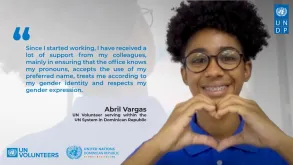"It was the first time I had seen an advertisement encouraging transgender people to apply for a particular role," says Abril Vargas, a UN Volunteer serving within the UN system in the Dominican Republic. Abril Vargas is an LGBTI Inclusion and Partnerships Technician and shares his experience in landing this volunteer opportunity.
The International Day of Trans Visibility is commemorated every year on March 31 – it is a date dedicated to promoting, celebrating and recognizing the participation of transgender people. However, in the Dominican Republic – as is the case in many places worldwide – transgender people are subject to discrimination and violence. An assessment of health needs of transgender people conducted in the country in 2015 uncovered that 79 pre cent of the transgender population had been denied employment or had been terminated because of their gender identity.
Considering the importance of highlighting the participation of transgender people in the workplace, UN Volunteer Abril Vargas, LGBTI Inclusion and Partnerships Technician for the UN System in Dominican Republic, shares a bit about his application process through the United Nations Volunteers (UNV) programme.
"I learned about the vacancy for a University UN Volunteer through social media, and the advert specifically encouraged transgender people to apply," Abril shares. "At the same time, the job posting was shared with LGBTI civil society organizations, so that they could inform transgender people in their relevant communities about this opportunity."
A workshop organized by UNV influenced his decisions; the facilitators explained how those interested could apply, all the while using inclusive language that respected the pronouns of all participants. Although the Dominican Republic, as a whole, still does not recognize the rights to change names for reasons of gender identity and gender labels on identity documents, this space served as a significant step toward inclusion, visibility and recognition.
Abril comments that the intentional usage of the correct personal pronouns is a way to respect transgender people and create an inclusive environment. Transgender people identify on a binary scale as either male or female; others may choose to use gender pronouns such as 'elles' or 'elle' instead of 'he', 'she' or 'they'.
Since I started working, I have received a lot of support from my colleagues, mainly in ensuring that the office knows my pronouns, accepts the use of my preferred name, treats me according to my gender identity and respects my gender expression. --Abril Vargas, UN Volunteer in the Dominican Republic
This support further motivates Abril to reach his full potential, as it truly underscores that everyone is committed to inclusion and respect for diversity.
In 2021, the United Nations prepared a report on the impact of COVID-19 on LGBTI people in the Dominican Republic. Some 40 per cent of LGBTI people surveyed reported that they were unemployed. Accordingly, Abril feels incredibly grateful to have gotten this opportunity, his first formal job. He had applied for other jobs on different occasions in the past, but was asked to adopt a different gender expression than the one he identifies with.
These steps are a good practice for transgender people to feel included, empowered, and welcome in the workplace. Maintaining inclusive recruitment practices is a sign that companies and institutions value and support transgender people, helping them feel safe and respected and offering them equal treatment in actions involving the use of their name, filling out forms and personal interactions.
As a volunteer, Abril conducts trainings for government officials, the private sector and other individuals. These aim to inform and sensitize participants about the human rights of the LGBTI population, with a special focus on transgender people, within the framework of the Free and Equal campaign, which is dedicated to promoting equal rights and equal treatment for LGBTI people.
The job posting itself exemplified a commitment to SDG10 – Reduced Inequalities – as well as to the central and unequivocal promise of the 2030 Agenda for Sustainable Development of leaving no one behind. In turn, Abril has found a role meant for him – one which, through his trainings and projects and initiatives, allows him to make great strides, great impact, and lead many others towards that promise, as well.
This article was prepared with the kind support of Online Volunteer Kaylin Lang.

